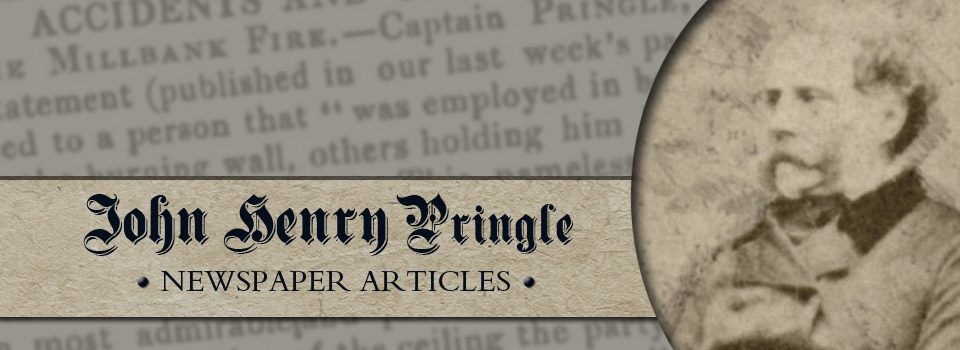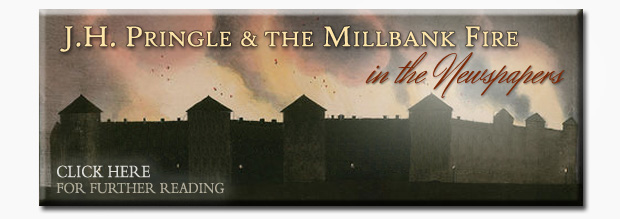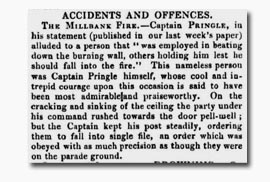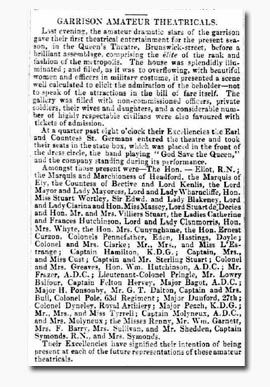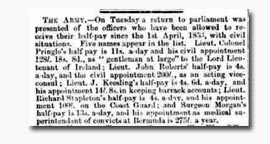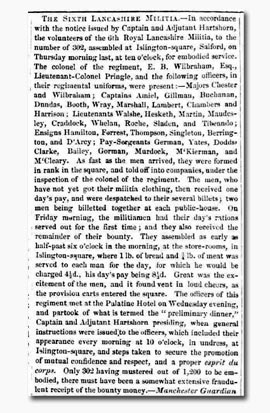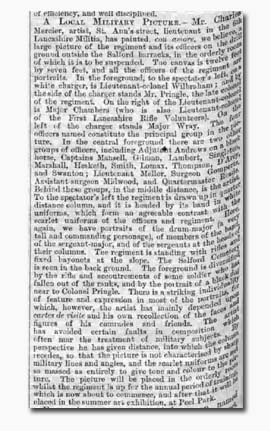Newspaper Accounts of John Henry Pringle
These article transcriptions are arranged in chronological order. To see a full biography or military facts about Lt.-Col. John Henry Pringle, just click on the button in the right-hand column.
"Morning Post" 10 Oct 1809, page 4:
BIRTHS.— On the 7th instant, the Lady of Colonel Pringle, of a son.
"Bell's New Weekly Messenger" 18 Oct 1835, page 10:
THE MILLBANK FIRE.— Captain Pringle, in his statement (published in our last week's paper) alluded to a person that "was employed in beating down the burning wall, others holding him lest he should fall into the fire." This nameless person was Captain Pringle himself, whose cool and intrepid courage upon this occasion is said to have been most admirable and praiseworthy. On the cracking and sinking of the ceiling the party under his command rushed towards the door pell-mell; but the Captain kept his post steadily, ordering them to fall into single file, an order which was obeyed with as much precision as though they were on the parade ground.
The Millbank Penitentiary fire (and John Henry Pringle's heroic actions there) attracted a lot of newspaper coverage. To read more about it, just click on the banner below.
"Morning Post" 14 Feb 1853, page 7:
GARRISON AMATEUR THEATRICALS.
Last evening, the amateur dramatic stars of the garrison gave their first theatrical entertainment for the present season, in the Queen's Theatre, Brunswick-street, before a brilliant assemblage, comprising the elite of the rank and fashion of the metropolis. The house was splendidly illuminated; and filled, as it was to overflowing, with beautiful women and officers in military costume, it presented a scene well calculated to elicit the admiration of the beholder --- not to speak of the attractions in the bill of fare itself. The gallery was filled with non-commissioned officers, private soldiers, their wives and daughters, and a considerable number of highly respectable civilians were also favoured with tickets of admission.
At a quarter past eight o'clock their Excellencies the Earl and Countess St. Germans entered the theatre and took their seats in the state box, which was placed in front of the dress circle, the band playing "God Save the Queen," and the company standing during its performance.
Amongst those present were --- The Hon. [Henry] Eliot, R.N.; the Marquis and Marchioness of Headford, the Marquis of Ely, the Countess of Vective and Lord Kenlis, the Lord Mayor and Lady Mayoress, Lord and Lady Wharncliffe, Hon. Miss Stuart Wortly, Sir Edwd. and Lady Blakeney, Lord and Lady Clarina and Hon. Miss Massey, Lord Stuart de Decies and Hon. Mr. and Mrs. Villiers Stuart, the Ladies Catherine and Frances Hutchinson, Lord and Lady Clanmorris, Hon. Mrs. Whyte, the Hon. Mrs. Cunynghame, the Hon. Ernest Curzon, Colonels Pennefather, Eden, Hastings, Doyle; Colonel and Mrs. Clarke; Mr., Mrs., and Miss L'Extrange; Captain Hamilton, K.D.G.; Captain, Mrs., and Miss Cust; Captain and Mr. Sterling Stuart; Colonel and Mrs. Greaves, Hon. Wm. Hutchinson, A.D.C.; Mr. Frazer, A.D.C.; Lieutenant-Colonel Pringle, Mr. Lowry Balfour, Captain Felton Hervey, Major Bagot, A.D.C.; Major H. Ponsonby, Mr. G.T. Dalton, Captain and Mrs. Bull, Colonel Pole, 63d Regiment; Major Dunford, 27th; Colonel Dyneley, Royal Artillery; Major Peach, K.D.G.; Mr., Mrs., and Miss Tyrrell; Captain Molyneux, A.D.C., and Mrs. Molyneux; the Misses Renny, Mr. Wm. Garnett, Mrs. F. Barry, Mrs. Sillivan, and Mr. Shedden, Captain Symonds, R.N., and Mrs. Symonds.
Their Excellencies have signified their intention of being present at each of the future representations of these amateur theatricals.
"Bell's Weekly Messenger" 15 Apr 1854, page 8:
THE ARMY.— On Tuesday a return to parliament was presented of the officers who have been allowed to receive their half-pay since the 1st April, 1853, with civil situations. Five names appear in the list. Lieut. Colonel Pringle's half pay is 11s. a day and his civil appointment 128 l. 18s. 8d., as "gentleman at large" to the Lord Lieutenant of Ireland.
"Liverpool Mailr" 20 Jan 1855, page 3:
LANCASHIRE MILITIA.— The Earl of Sefton, Lord Lieutenant of the County, has signed the following commissions:—
6th Royal Lancashire Militia: The Hon. E.B. Wilbraham, Colonel unattached, late of the Coldstream Guards, to be Honorary Colonel; J.H. Pringle, Esq., Colonel unattached, late of the Coldstream Guards, to be Lieutenant-Colonel commanding.
"The Gentleman's Magazine" February 1855, page 181:
Promotions and Preferments.
6th Lancashire Militia, Hon. Edw. B. Wilbraham, late of Coldstream Guards, to be Hon. Colonel; J.H. Pringle, esq. late of Coldstream Guards, to by Lieut.-Col. Commanding.
"Morning Post" 21 May 1855, page 2:
THE SIXTH LANCASHIRE MILITIA.— In accordance with the notice issued by Captain and Adjutant Hartshorn, the volunteers of the 6th Royal Lancashire Militia, to the number of 302, assembled at Islington-square, Salford, on Thursday morning last, at ten o’clock, for embodied service. The colonel of the regiment, E.B. Wilbraham, Esq., Lieutenant-Colonel Pringle, and the following officers, in their regimental uniforms, were present:- Majors Chester and Wilbraham; Captains Amiel, Gillman, Buchanan, Dundas, Booth, Wray, Marshall, Lambert, Chambers and Harrison; Lieutenants Walshe, Hesketh, Martin, Maudesley, Craddock, Whelan, Roche, Sladen, and Tibeando; Ensigns Hamilton, Forrest, Thompson, Singleton, Berrington, and D’Arcy; Pay-Sergeants German, Yates, Dodds, Clarke, Bailey, Gorman, Murdock, McKierman, and McCleary. As fast as the men arrived, they were formed in rank in the square, and told off into companies, under the inspection of the colonel of the regiment. The men, who have not yet got their militia clothing, then received one day’s pay, and were despatched to their several billets; two men being billetted together at each public house. On Friday morning, the militiamen had their day’s rations served out for the first time; and they also received the remainder of their bounty. They assembled as early as half-past six o’clock in the morning, at the store-rooms, in Islington-square, where 1 lb. of bread and 3/4 lb. of meat was served to each man for the day, for which he would be charged 4-1/2d., his day’s pay being 8-1/2d. Great was the excitement of the men, and it found vent in loud cheers, as the provision carts entered the square. The officers of this regiment met at the Palatine Hotel on Wednesday evening, and partook of what is termed the “preliminary dinner,” Captain and Adjutant Hartshorn presiding, when general instructions were issued to the officers, which included their appearance every morning at 10 o’clock, in undress, at Islington-square, and steps taken to secure the promotion of mutual confidence and respect, and a proper esprit du corps. Only 302 having mustered out of 1,200 to be embodied, there must have been a somewhat extensive fraudulent receipt of the bounty money.— Manchester Guardian
"Kentish Independent" 26 May 1855, page 5:
On Thursday morning week the volunteers of the 6th Royal Lancashire Militia, 302 in number, assembled for embodied service. The colonel of the regiment, E.B. Wilbraham, Esq., Lieutenant Colonel Pringle, and other officers, were present. The men having been told off into companies, had their hair cut, and thoroughly cleansed with soap and water, were despatched to their several billets. On Friday they received tations for the first time, and the remainder of their bounty. The militia uniform and arms are daily expected. The officers partook of what is termed the "preliminary dinner," at the Palatine Hotel, on Wednesday. Only 302 men having mustered out of 1,200 to be embodied, there must have been a somewhat extensive fraudulent receipt of the bounty money.
"Morning Post" 30 May 1855, page 11:
NAVAL AND MILITARY INTELLIGENCE.
The 6th Royal Lancashire Militia.—
The drilling of this regiment of militia is proceeding satisfactorily, the men attending every day for several hours at the depot, Islington-square, Salford, for that purpose. On Tuesday morning, on assembling, they caused so much disturbance, that Colonel Pringle addressed them upon the impropriety of their conduct, and said that if such unsoldierlike conduct were repeated he should feel it his duty to punish the offenders. With this exception the men have conducted themselves properly. Colonel Pringle, having consulted with Captain and Adjutant Hartshorn, promised the men, if they continued to deserve the privilege, to allow them to attend the Manchester races one day this week.— "Manchester Guardian"
"Preston Chronicle" 24 May 1856, page 4:
LANCASHIRE MILITIA.—
The 6th Regiment of Lancashire Militia was reviewed in the square fronting the Town Hall, Salford, on Monday, by Lieut.-Colonel Pringle, Colonel Wilbraham being also present. At the close of the review, Lieut.-Colonel Pringle read to the men the order for their disembodiment, which is to take place on the 27th inst. He then read to them the resolutions of the House of Lords and the House of Commons, conveying thanks to the militia for their services.
"Derbyshire Advertiser and Journal" 13 Feb 1857, page 4:
LANCASTER'S PANORAMA OF THE LATE WAR.— The above panorama opened in the Athenaeum room on Wednesday evening last. We have not yet been able to pay the exhibition a visit, but we have before us "Opinions of the Press" from many of the leading cities and towns in England, all of which speak of it in the highest terms. The "Manchester Courier" says: — "The Grand Moving Panorama of the Seat of War, now exhibiting at the Exchange Rooms, is attracting very numerous audiences. Some of the scenes are remarkably effective, and their interest is increased by a descriptive lecture given in the progress of the panorama. Several popular songs are sung during intervals of the exhibition, and last evening, when the entertainment was under the patronage of Lieut. Colonel Pringle and the officers of the 6th Royal Lancashire Militia, Mr. Higham's private band attended and performed a selection of appropriate music."
"Illustrated London News" 13 Jul 1861, page 7:
THE VOLUNTEER MOVEMENT.
The officers of the 6th Royal Lancashire Militia have presented a handsome salver and tea and coffee service to Colonel Pringle, on his retirement from the command of the regiment, which he has held for the last six years.
"West London Observer" 13 Dec 1862, page 1:
Cotton Districts Relief Fund.
Parish of Kensington.
Subscriptions . . .
Received at the London and County Bank, Kensington.
Colonel Pringle . . . 5 pounds.
"Manchester Courier and Lancashire General Advertiser" 18 Apr 1864, page 2:
A LOCAL MILITARY PICTURE.
Mr. Charles Mercier, artist, St. Ann's-street, lieutenant in the 6th Lancashire Militia, has painted "con amore", we believe, a large picture of the regiment and its officers on the drill ground outside the Salford barracks, in the orderly room of which it is to be suspended. The canvas is twelve feet by seven feet, and all the officers of the regiment are portraits. In the foreground, to the spectator's left, on a white charger, is Lieutenant-colonel Wilbraham; and by the side of the charger stands Mr. Pringle, the late colonel of the regiment. On the right of the Lieutenant-colonel is Major Chambers (who is also Lieutenant-colonel of the First Lancashire Rifle Volunteers). On the left of the charger stands Major Wray. The four officers named constitute the principal group in the picture. In the central foreground there are two other groups of officers, including Adjutant Andrews on a black horse, Captains Mansell, Gilman, Lambert, Singleton, Marshall, Hesketh, Smith, Lomax, Thompson, D'Arcy, and Swanton; Lieutenant Mellor, Surgeon Gomperts, Assistant-surgeon Midwood, and Quartermaster Reade. Behind these groups, in the middle distance, is the artist. To the spectator's left the regiment is drawn up in quarter distance column, and it is headed by its band in white uniforms, which form an agreeable contrast with the scarlet uniforms of the officers and regiment. Here, again, we have portraits of the drum-major (a very tall and commanding personage), of members of the band, of the sergeant-major, and of the sergeants at the heads of their columns. The regiment is standing with rigles and fixed bayonets at the slope. The Salford Cemetery is seen in the back ground. The foreground is diversified by the rigle and accoutrements of some soldier who has fallen out of the ranks, and by the portrait of a black dog near to Colonel Pringle. There is a striking individuality of feature and expression in most of the portraits, for which, however, the artist has mainly depended upon cartes de visite and his own recollection of the faces and figures of his comrades and friends. The artist has avoided certain faults in composition which often mar the treatment of military subjects. By perspective he has given distance, into which the column recedes, so that the picture is not characterised by sharp military lines and angles, and the scarlet uniforms are not so massed as entirely to give tone and colour to the picture. The picture will be placed in the orderly room whilst the regiment is up for the annual period of training, which is now about to commence, and after that it will be placed in the summer art exhibition, at Peel Park.
"The New Army List and Militia List" by H.G. Hart, 1868, page 446:
J.H. Pringle, late of Scots. Fus. Gds., killed from falling over precipice at Bex, Switzerland, aged 68 (27 July).
"The Empire" (Sydney, Australia) October 28, 1868:
SINGULAR AND FATAL ACCIDENTS
For some weeks past Colonel Pringle, late of the Coldstream Guards, had been residing with his wife and some of the younger members of his family at Bex, about half way between the eastern extremity of the Lake of Geneva and Martigny. On the afternoon of Sunday, the 26th July, he left his house for a walk on the hills in the neighborhood. Much alarm was caused by his not having returned during the evening. Nothing having been heard of him during the following day, the authorities of the place set more than a hundred men to search the country round to obtain intelligence of the missing gentleman; but it was not till the eighth day afterwards that his body was found. A peasant discovered it lying at the bottom of a ravine known, not inappropriately, as the 'Creux d'Enfer'. He had fallen over a perpendicular precipice 200 feet high. From the appearance of the body it is certain that death must have been instantaneous, as, in addition to other injuries his skull was extensively fractured. His broken watch, which had stopped at 3 o'clock, most probably indicated the hour of occurence --- namely 3 a.m. of Monday, July 27. His remains were interred at the cemetery at Bex on August 3. The deceased officer was a great grandson of the first Earl of Chatham, great-nephew of William Pitt, and one of the editors of the 'Chatham Correspondence'.
